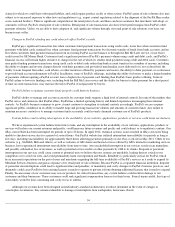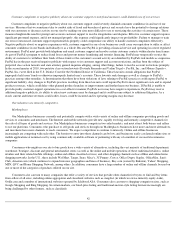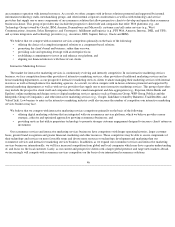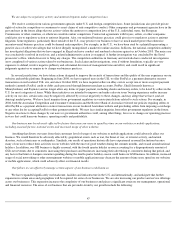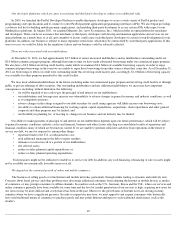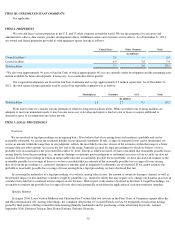eBay 2012 Annual Report Download - page 46
Download and view the complete annual report
Please find page 46 of the 2012 eBay annual report below. You can navigate through the pages in the report by either clicking on the pages listed below, or by using the keyword search tool below to find specific information within the annual report.
would make our site attractive relative to other alternatives. For example, in June 2012, Adidas Group announced that it intends to restrict its
dealers, on a global basis, from listing and selling Adidas and Reebok products on sites including eBay.com, and Nike Inc. and ASICS Corp.
have taken steps to similarly restrict Internet sales of their products on platform sites such as eBay.com. The adoption by manufacturers of
policies, or the adoption of new laws or regulations or interpretations of existing laws or regulations by government authorities, in each case
discouraging or restricting the sales of goods or services over the Internet, could force eBay users to stop selling certain products on our
websites. Increased competition or anti-
Internet distribution policies or regulations may result in reduced operating margins, loss of market share
and diminished value of our brands. As we respond to changes in the competitive environment, we may, from time to time, make pricing, service
or marketing decisions or acquisitions that may be controversial with and lead to dissatisfaction among some of our sellers, which could reduce
activity on our websites and harm our profitability.
Although we receive Internet traffic from several large online services and search engine providers, these arrangements may not continue
on favorable terms or these companies may decide to promote competitive services. In any event, such arrangements may not result in increased
usage of our sites. In addition, companies that control user access to transactions through network access, Internet browsers, mobile networks,
operating systems or search engines could promote our competitors, channel current or potential users to their vertically integrated electronic
commerce sites or their advertisers' sites, attempt to restrict access to our sites, or charge us substantial fees for inclusion. For example, Google
increasingly may steer its users to its own sites, adversely affecting traffic to our sites. Search engines increasingly are becoming a starting point
for online shopping, and as the costs of operating an online store continue to decline, online sellers may increasingly sell goods through multiple
channels, which could reduce the number and value of transactions these sellers conduct through our sites.
PayPal
The markets for PayPal's products and services are intensely competitive and are subject to rapid technological change, including but not
limited to: mobile payments, electronic funds transfer networks allowing Internet access, cross-border access to payment networks, creation of
new payment networks, and new technologies for enabling merchants, both online and offline, to process payments more simply. PayPal faces
competition and potential competition from existing online, mobile and offline payment methods, including, among others:
PayPal also faces competition and potential competition from:
44
• providers of traditional payment methods, particularly credit and debit cards, checks, money orders and Automated Clearing House
transactions (these providers are primarily well-established banks);
• providers of “digital wallets” which offer customers the ability to pay online or on mobile devices through a variety of payment
methods, including Visa's V.me, American Express's Serve, Google Wallet and the recently announced Merchant Customer
Exchange (MCX) initiative supported by Walmart, Target and other major U.S. retailers;
• payment-card processors that offer their services to merchants, including Square, Chase Paymentech, First Data, Wells Fargo,
WorldPay, Barclays Merchant Services, Global Payments, Inc., and Stripe, and payment gateways, including CyberSource and
Authorize.net (both owned by Visa), Braintree and First Data;
• Amazon Payments, which offers merchants the ability to accept credit card- and bank-funded payments from Amazon's base of
online and mobile customers on the merchant's own website; and
• providers of mobile payments, including ISIS in the U.S., Buyster in France, Mpass in Germany, Weve in the U.K., Boku, Venmo
(acquired by Braintree) and Crandy, many of which are owned by or supported by major mobile carriers.
•
money remitters such as MoneyGram, Western Union, Global Payments, Inc. and Euronet;
•
bill payment services, including CheckFree, a subsidiary of Fiserv;
• services that provide online merchants the ability to offer their customers the option of paying for purchases from their bank account
or paying on credit, including ClearXchange (a joint venture among Wells Fargo, Bank of America and JP Morgan Chase), Western
Union's WU Pay, Dwolla, Acculynk, TeleCheck (a subsidiary of First Data), iDEAL in the Netherlands, Sofortuberweisung in
Germany and the recently-announced MyBank pan-European initiative;
•
issuers of stored value targeted at online payments, including NetSpend, Green Dot, PayNearMe and UKash;
• online payment-services providers such as AliPay, the PayU group of companies (owned by Naspers), PagSeguro, Bcash (owned by
Naspers) and Klarna;
• other providers of online account-based payments, such as Skrill, ClickandBuy (owned by Deutsche Telekom), Barclays Pingit in the
U.K., Kwixo in France, and Paymate and Visa PayClick in Australia;


